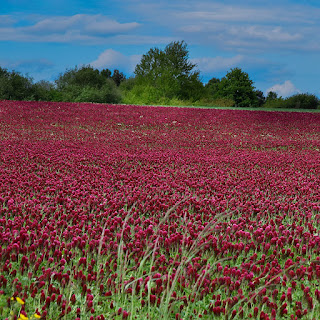A lot of backyard gardeners probably don't think too much about the uses and benefits of cover crops albeit there are various reasons for such things. I mean, there are some people out there that plant a garden every year that don't even know about the benefits of crop rotation, either, but that's another subject entirely.
Anyway, commercial farmers often use various types of plants for this, depending on their desired result. Some of the reasons are to help prevent soil erosion, add nitrogen to the soil (if you select legumes like peas and beans or crimson clover, for example), weed management, moisture regulation, food for farm animals (hunters and animal lovers may also use cover crops to feed local wildlife, etc.), and to provide future mulch and/or what some people call "green manure" along with a few other reasons. When I say moisture regulation, I basically mean they help with water infiltration. Have you ever seen certain areas of ground (especially compacted soil) that always just puddles up even with the slightest bit of rain? Yeah, I'm talking about the opposite of that...
I'm not going to cover all of the different aspects of cover crops on this post, as it will be just a general guide for the person with a small to medium-sized garden. When it comes to that, the main reasons are to benefit soil health, add nitrogen, and attract pollinators to the area. Most folks with normal sized gardens don't have to worry with weed control (if you put in the work), moisture regulation or soil erosion, I wouldn't think. Unless you are a farmer, most people do not have cows and goats roaming around in their yard either, so I doubt the average person will need cover crops to help feed their livestock. However, I have known a few people out in the country that have fenced-in goats so they never have to mow their yard, but those animals will eat any type of vegetation they can get into their mouth. Trust me, I've been around goats before, and they are not picky eaters. Pretty much, if it's not meat, they are interested. I still remember this one goat in particular that even tried to smoke a cigarette that the person next to me was holding; ha! Wait a minute, I actually have a picture of this bizarre "smoking goat" from the past, and I will post it below:
Okay, now back to the main subject...
Out of all the reasons and benefits for cover crops, when it comes to the average gardener, the improved soil quality via organic matter recycling within the soil along with the fertilization that occurs by way of nitrogen release from legumes, are the main advantages of this. There are many different cover crops you can choose from, depending on your needs, but for the typical gardener we will go with legumes. Instead of using up your seeds from your leftover beans and peas, I recommend going with clovers. Plus, they are also normally a good bit cheaper than the seeds for food crops that I just mentioned. In this particular case, I selected the easy to grow, highly attractive Crimson Clover.
Its scientific name is Trifolium incarnatum (not that most people would call it that), but some people do refer to it as the Italian Clover, as well. A quote from Wikipedia states, "[...] a species of flowering plant in the family Fabaceae, native to most of Europe. It has been introduced to other areas, including the United States and Japan. The plant is widely grown as a protein-rich forage crop for cattle and other livestock and is suitable to be made into hay. It is commonly grazed by domestic and wild ruminants. It is often used for roadside erosion control, as well as beautification. Crimson clover's flowers and sprouts are edible. They can be added as an ingredient in salads, sandwiches, etc." I selected that excerpt because it mentioned some of the other benefits besides its main reasons for the backyard gardener, which is to mostly fix the nitrogen in the soil and improve the quality of your growing substrate.
From the Amazon product page (with a minor edits): "Crimson clover is a winter annual with dark green, oval leaflets containing no V-shaped water mark making it easy to distinguish from other annual clovers. Crimson prefers well-drained soils and a pH between 5.0 - 6.5, but it is not extremely picky. It is the fastest growing of the annual clovers, easy to establish, and handles shade well. Crimson clover is a cheap, easy, productive, tasty, cool season grazing material for deer. It starts fast, withstands continuous grazing and produces a consistent, heavy seed crop with good reseeding potential."
If you live in the southern part of the U.S., the Crimson clover is an excellent choice for a cover crop to use after your summer & fall harvest has been completed. I planted mine where I live in September this year. The Crimson clover, unlike some clovers, can withstand freezing temperatures and does really well in southern winters. The timing of this crop is most likely different for the northern region, but it is really beautiful when it blooms, nonetheless. Well, I think I'll drop down another image of these attractive clovers and provide a link in case you're interested in this type of plant.



No comments:
Post a Comment